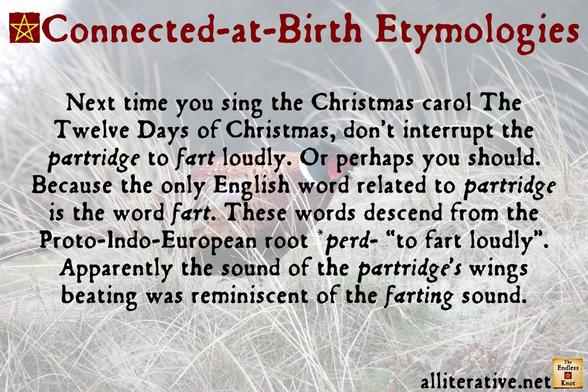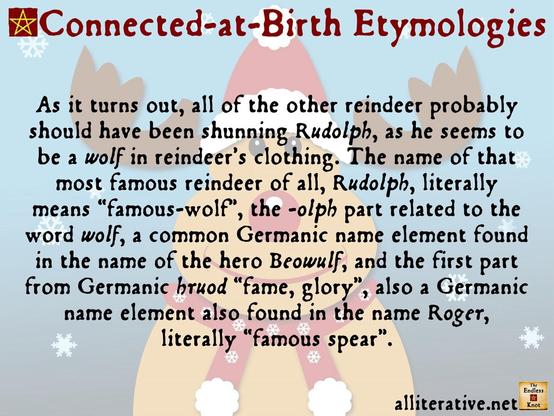The #ConnectedAtBirth #etymology of the week is PARTRIDGE/FART #wotd #partridge #fart #Christmas #Xmas #TheTwelveDaysOfChristmas #The12DaysOfChristmas
#Etymology
“Lake Chargoggagoggmanchauggagoggchaubunagungamaugg: Yes, you read that correctly. ‘The name of this lake delighted and baffled us when it started clogging the Top Lookups list on Merriam-Webster.com,’... But in New England? It's known as Webster Lake.”
#etymology
"Slop" chosen as Merriam-Webst...
Merriam-Webster’s human editors have chosen slop as the 2025 Word of the Year. We define slop as “digital content of low quality that is produced usually in quantity by means of artificial intelligence.” All that stuff dumped on our screens, captured in just four letters: the English language came through again.
https://www.merriam-webster.com/wordplay/word-of-the-year
misdemeanor / high misdemeanor
https://www.wordorigins.org/big-list-entries/misdemeanor-high-misdemeanor
i've been called "weird" but never knew this was the meaning of the word. i shall wear this word with pride.
Book review: ‘Word Drops’, by Paul Anthony Jones
If linguistic trivia is your flavour of the month, there’s a treat in store for you. Speaking of which, did you know the first thing to be described as having a flavour of the month is ice cream? This inconsequential yet pleasing fact is one of many to be found in Word Drops: A Sprinkling of Linguistic Curiosities by Paul Anthony Jones, aka Haggard Hawks.
The publishers of this diverting work, Elliott & Thompson (who kindly sent me a review copy), describe it as addictive – and it is certainly that. Each page contains a handful of intriguing word-related trivia, much of it etymological or semantic. Weird terms, old slang and surprising histories abound. But unlike most trivia books, which are structured thematically, Word Drops is arranged sequentially:
In Victorian slang, a sandillion was an incalculably large number, equivalent to the number of grains of sand on a beach.
A sandgroper is an inhabitant of Western Australia.
Hanyauka means ‘to tiptoe across hot sand’ in the Kwangali Bantu language of Namibia.
Anyone described as tiptoe-nice is overly and fastidiously prim and delicate.
The ‘toe’ of mistletoe is derived from the Old English word for ‘twig’.
A brancher is a young bird that has just left the nest and begun hopping about the branches.
And so it continues, hopping playfully from one ‘drop’ to the next in a book-long string of word lore. It’s a simple but effective conceit, inducing a second-order curiosity quite aside from one’s interest in the items themselves: you begin wondering which element of the line you’re poring over will prove the seed for the next, and how.
Many ‘drops’ stand alone, as above, but others are accompanied by supplementary material indented in smaller text. These lend historical and other background information, and provide a nice change of pace. Here’s a sample passage supplementing the datum that people from Wiltshire are known as moonrakers:
According to the eighteenth-century lexicographer Francis Grose, the nickname moonraker commemorates ‘some Wiltshire rustics’, who ‘seeing the figure of the moon in a pond attempted to rake it out’. Wiltshire locals today, however, tend to put their own spin on this story by claiming the men were actually trying to reach smuggled barrels of brandy they had earlier sunk in the pond when they were interrupted by revenue officers and feigned stupidity to escape prosecution.
Some drops left me wishing for more such elaboration. Machaeromancy, for instance, ‘is a form of divination that uses knives and blades’. Marvellous – but uses them how!? I had to look elsewhere to find out. Endnotes would have countervailed some of the vagueness and equivocation (‘thought to derive from’, ‘said to mean’…), but other readers may favour the uninterrupted presentation chosen.
The fact-checking occasionally falls short. Volcano is not an example of anapaest, since the order of short/unstressed and long/stressed syllables is crucial. Platypodes and octopodes are not ‘the only truly correct forms’ unless you think English should behave like Greek. Fuck is a couple of centuries older than 1475 (and bowdlerising another swearword seems unduly prim).
But these are rare lapses in a book that proves a frequent delight. It glosses such euphonious eccentrics as frumberdling (a boy growing his first beard), aspectabund (having a very expressive face), vernalagnia (a good mood brought on by fine spring weather), hibernacle (where a hibernating animal sleeps), mateotechny (a pointless scientific study), ignipotence (the power to control fire), our old friend clishmaclaver, and my new favourite rhabdosophy (gesturing with a stick to help convey a meaning).
Nonce words make an appearance too, such as James Joyce’s mrkgnao for the sound of a cat’s miaow – though it seems a shame to omit the other onomatopoeic spellings Joyce used in Ulysses, since the great effect lies in their graded impression of the animal’s anticipation of breakfast: Mkgnao!; Mrkgnao!; Mrkrgnao! (and once the milk is served, Gurrhr!).
Etymology is a recurring theme. Fesnyng, a word for a group of ferrets, arose from a 15thC misreading of besynes [business]. The dashboard of a car was extended from an analogous item in horse carriages designed to stop mud dashing the driver. The magic exclamation shazam is acronymic, appearing first in Whiz Comics in 1940 where it bestows Billy Batson with the wisdom of Solomon, strength of Hercules, stamina of Atlas, power of Zeus, courage of Achilles, and speed of Mercury – at which point he becomes Captain Marvel for the first time.
Oddities from other languages also feature in abundance. After noting that the German slang word Unterhosenbügler ‘wimp’ literally means ‘one who irons his underpants’, Jones reports an early-20thC trend in German for coining ever more evocative compounds with the same essential sense as Weichei ‘wimp, softie’:
Amongst the first to emerge was Warmduscher, ‘one who takes warm showers’, but this was soon joined by countless others, including Schattenparker, ‘one who parks their car in the shade’; Bei-Mami-Wäscher, ‘one who does his laundry at his mother’s house’; Auf-dem-Schrank-Staubwischer, ‘one who dusts on top of the wardrobe’; Beipackzettel-Leser, ‘one who reads the warning labels on drug prescriptions’; Vorwärtseinpacker, ‘one who drives forwards into a parallel parking space’; and even Sitzpinkler, ‘one who urinates sitting down’. As well as being an Unterhosenbügler, incidentally, you can also be a Sockenfalter – ‘one who folds his socks’.
Word Drops is sure to go down well with confirmed word lovers, but it will also appeal more broadly – it’s hard to imagine anyone not being charmed by this breezy medley of self-contained yet interconnected miscellany. Once you pick up the string, you’ll be tempted to keep pulling till you reach the end, and how quickly that takes may depend chiefly on how often you stop to share its contents with a neighbour.
You can order Word Drops from your usual bookstore or via Elliott & Thompson.
#bookReview #books #etymology #haggardHawks #history #languageHistory #paulAnthonyJones #phrases #wordDrops #wordplay #words
And the “-ger” part of "Roger” also appears in "garlic”—literally “spear leek”.
#etymology https://toot.community/@AllEndlessKnot/115684991273671288
📖 New Research Entry
"Aqua Temporis: The Flooded Archives and the Speaking Tubes of the Deep"
Emerging from the depths of Lake Silent, I now stand within the hallowed, water-filled halls of Aqua Temporis, an archive unlike any other, where the very act of speaking might unlock forgotten truths and connections to the surface.
https://chronostrange.com/aqua-temporis-the-flooded-archives-and-the-speakin/
#ChronoStrange #Mystery #HistoricalMystery #Etymology #TimeTravel
19 nearly-extinct 'fossil words' that only survive hidden inside these specific idioms
https://fed.brid.gy/r/https://www.upworthy.com/19-fossil-words-hidden-inside-idioms
The surprisingly connected origins of "stream" and "rhythm".
#etymology #wordnerd #linguistics #HistoricalLinguistics #language #words #lingcomm #stream #rhythm
hobbit: folklore (possibly) inspiring literature that inspires science
📖 New Research Entry
"The Quantum Echo Chamber: Resonating Realities Across Time"
As I delve into the enigmatic Quantum Echo Chamber, I uncover echoes of past and future realities reverberating through space-time, challenging the very fabric of existence.
https://chronostrange.com/the-quantum-echo-chamber-resonating-realities-acro/
#ChronoStrange #Mystery #HistoricalMystery #Etymology #TimeTravel
The #ConnectedAtBirth #etymology of the week is RUDOLPH/WOLF #wotd #Rudolph #wolf #RudolphTheRedNosedReindeer
#Christmas #Christmas2025 #Xmas
Fun fact: the word “football” used to refer to *any* game involving a ball, two teams, and goal lines, played on level ground. This word dates back to at least the 1400s.
The word “soccer” came much later, as a slang term that referred to the game that followed the rules of the English Football Association in the 1860s. “Soccer” is an abbreviation of “asSOCiation”, and it was used to distinguish the game from “rugger”, which referred to Rugby Football, which was named after the school in Rugby, Warwickshire, England.
So, “American football”, or more traditionally, “gridiron football” is a historically sensible term to use for the game that the NFL organizes. Not only that, “soccer” is actually the more correct name for the game that FIFA organizes.
No. 18 in my –ería collection was "florería" as the Spanish word for flower shop. Here we have the very similar "floristería," which translates more as "florist's shop" but is essentially the same thing: a place to buy flowers.
One distinction between florería and floristería is regional, with "florería" generally preferred in Latin America and "floristería" preferred in Spain. Another distinction is that a florería is a small shop or kiosk that sells only fresh-cut flowers, while a floristería is a business that sells professionally designed floral arrangements. But the words can generally be used interchangeably without much confusion.
June 2022 | Barcelona, Spain
#spanish #language #signs #streetphotography #urbanexploration #urbanwalking #graphicdesign #etymology
The Spanish word for "flower" is "flor," so tack on the –ería suffix and you get "florería" for a flower shop, like this one in Mexico City.
May 2023 | Mexico City, Mexico
#spanish #language #signs #streetphotography #urbanexploration #urbanwalking #graphicdesign #etymology
The Spanish word for "baguette," the long skinny bread of French origin, is simply "baguete" (or even "baguette"), so just stick an –ería on the end and we have a baguette shop, like this one in the Miraflores barrio of Lima.
June 2025 | Lima, Peru
#spanish #language #signs #streetphotography #urbanexploration #urbanwalking #graphicdesign #etymology










